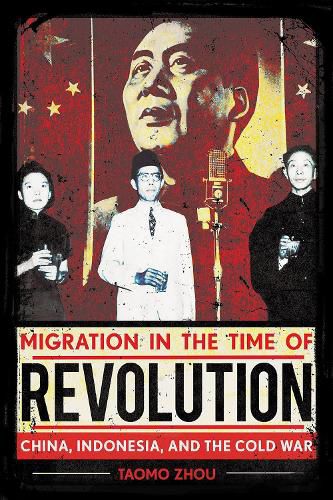Readings Newsletter
Become a Readings Member to make your shopping experience even easier.
Sign in or sign up for free!
You’re not far away from qualifying for FREE standard shipping within Australia
You’ve qualified for FREE standard shipping within Australia
The cart is loading…






Migration in the Time of Revolution examines how two of the world’s most populous countries interacted between 1945 and 1967, when the concept of citizenship was contested, political loyalty was in question, identity was fluid, and the boundaries of political mobilization were blurred. Taomo Zhou asks probing questions of this important period in the histories of the People’s Republic of China and Indonesia. What was it like to be a youth in search of an ancestral homeland that one had never set foot in, or an economic refugee whose expertise in private business became undesirable in one’s new home in the socialist state? What ideological beliefs or practical calculations motivated individuals to commit to one particular nationality while forsaking another?
As Zhou demonstrates, the answers to such questions about ordinary migrants are crucial to a deeper understanding of diplomatic relations between the two countries. Through newly declassified documents from the Chinese Foreign Ministry Archives and oral history interviews, Migration in the Time of Revolution argues that migration and the political activism of the ethnic Chinese in Indonesia were important historical forces in the making of governmental relations between Beijing and Jakarta after World War II. Zhou highlights the agency and autonomy of individuals whose life experiences were shaped by but also helped shape the trajectory of bilateral diplomacy. These ethnic Chinese migrants and settlers were, Zhou contends, not passively acted upon but actively responding to the developing events of the Cold War. This book bridges the fields of diplomatic history and migration studies by reconstructing the Cold War in Asia as social processes from the ground up.
Honorable mention for the Harry J. Benda Prize (Southeast Asia Council, Association for Asian Studies) A Foreign Affairs Best Books of 2020
$9.00 standard shipping within Australia
FREE standard shipping within Australia for orders over $100.00
Express & International shipping calculated at checkout
Migration in the Time of Revolution examines how two of the world’s most populous countries interacted between 1945 and 1967, when the concept of citizenship was contested, political loyalty was in question, identity was fluid, and the boundaries of political mobilization were blurred. Taomo Zhou asks probing questions of this important period in the histories of the People’s Republic of China and Indonesia. What was it like to be a youth in search of an ancestral homeland that one had never set foot in, or an economic refugee whose expertise in private business became undesirable in one’s new home in the socialist state? What ideological beliefs or practical calculations motivated individuals to commit to one particular nationality while forsaking another?
As Zhou demonstrates, the answers to such questions about ordinary migrants are crucial to a deeper understanding of diplomatic relations between the two countries. Through newly declassified documents from the Chinese Foreign Ministry Archives and oral history interviews, Migration in the Time of Revolution argues that migration and the political activism of the ethnic Chinese in Indonesia were important historical forces in the making of governmental relations between Beijing and Jakarta after World War II. Zhou highlights the agency and autonomy of individuals whose life experiences were shaped by but also helped shape the trajectory of bilateral diplomacy. These ethnic Chinese migrants and settlers were, Zhou contends, not passively acted upon but actively responding to the developing events of the Cold War. This book bridges the fields of diplomatic history and migration studies by reconstructing the Cold War in Asia as social processes from the ground up.
Honorable mention for the Harry J. Benda Prize (Southeast Asia Council, Association for Asian Studies) A Foreign Affairs Best Books of 2020